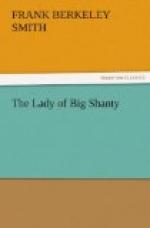During such a forced march in the wilderness conversation is difficult; one is content with one’s own thoughts. Under the mental and physical strain they were enduring their bodies moved automatically. During this unconscious process of locomotion one can dream over one’s thoughts and still go on. Legs and arms move themselves; sore muscles become reconciled to their burden—they become numb; the mind is thus left alone in peace.
Alice Thayor’s thought was occupied with the incidents leading to her last evening with Sperry. Every feature stood out in bold relief. Even the tones of the doctor’s voice rang clear. As these thoughts crowded in, one after another, her brain reeled, her eyes became dim. Missing her footing she sank back in the mud, steadied herself against a tree, brushing the damp hair out of her eyes and staggered on, her gaze fixed upon the swaying pack ahead of her fastened to the Clown’s shoulders.
The old dog now fell out of file; she felt his steaming muzzle bump under the palm of her hand. Since they started from their refuge across Big Shanty Brook the old dog had gone thus from one to the other. Twice she had patted him; she wanted him near her now in her weariness, but he left her the next moment to join Margaret. Her husband trudged on under his heavy pack in front of the Clown; he spoke encouragingly to those in front and behind him—and to her. Once in a while, when they came to a halt in a difficult place, he supported her with his arm and a cheery word. She would have marvelled at his grit had she not overheard his talk to Dollard. Now and then she could see Margaret, her ankles incased in rough woollen socks showing above the tops of the Clown’s brogans. Margaret followed Holcomb when it was possible, and the two often walked abreast talking low and earnestly. Twice Alice was about to call her maid. The fatigue was telling terribly on this woman accustomed to luxury. Then she remembered her husband’s words: “Whatever is in store for us we must share in common.” Farther on Blakeman noticed his mistress turn her white face over her shoulder and look at him appealingly. He came toward her lurching under his load.
“What is it, madam?” he asked.
“Oh, Blakeman, I’m so tired! Stand here with me a minute—and you—do the straps cut your shoulders?”
A curious expression—one of intense surprise, followed instantly by one of tenderness and pity—crossed his countenance. Never before, in all their intercourse, had she spoken to him one word of kindness—one personal to himself.
“No, madam,” he answered quietly, “I’m all right, thank you.”
When he overtook Holcomb later on he related the incident, at which Holcomb’s eyes filled. “It is the Margaret in her,” Billy had said to himself. Perhaps, after all, he had misjudged her. The butler said nothing of what he had seen and heard behind the pantry door. She had confirmed his diagnosis made to Holcomb that day in the woods—“She’s a fool but I don’t think she’s crooked.” Better let well enough alone.




